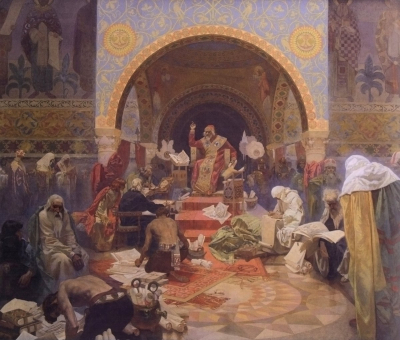Nicholas II or Nikolai II Alexandrovich Romanov (18 May [O.S. 6 May] 1868 17 July 1918), known in the Russian Orthodox Church as Saint Nicholas the Passion-Bearer, was the last Emperor of Russia, King of Congress Poland and Grand Duke of Finland, ruling from 1 November 1894 until his abdication on 15 March 1917. During his reign, Nicholas gave support to the economic and political reforms promoted by his prime ministers, Sergei Witte and Pyotr Stolypin. He advocated modernization based on foreign loans and close ties with France, but resisted giving the new parliament (the Duma) major roles. Ultimately, progress was undermined by Nicholas's commitment to autocratic rule, strong aristocratic opposition and defeats sustained by the Russian military in the Russo-Japanese War and World War I. By March 1917, public support for Nicholas had collapsed and he was forced to abdicate the throne, thereby ending the Romanov dynasty's 304-year rule of Russia (16131917).
Nicholas signed the Anglo-Russian Convention of 1907, which was designed to counter Germany's attempts to gain influence in the Middle East; it ended the Great Game of confrontation between Russia and the British Empire. He aimed to strengthen the Franco-Russian Alliance and proposed the unsuccessful Hague Convention of 1899 to promote disarmament and solve international disputes peacefully. Domestically, he was criticised for his government's repression of political opponents and his perceived fault or inaction during the Khodynka Tragedy, anti-Jewish pogroms, Bloody Sunday and the violent suppression of the 1905 Russian Revolution. His popularity was further damaged by the Russo-Japanese War, which saw the Russian Baltic Fleet annihilated at the Battle of Tsushima, together with the loss of Russian influence over Manchuria and Korea and the Japanese annexation of the south of Sakhalin Island.During the July Crisis, Nicholas supported Serbia and approved the mobilization of the Russian Army on 30 July 1914. In response, Germany declared war on Russia on 1 August 1914 and its ally France on 3 August 1914, starting the Great War, later known as the First World War. The severe military losses led to a collapse of morale at the front and at home; a general strike and a mutiny of the garrison in Petrograd sparked the February Revolution and the disintegration of the monarchy's authority. After abdicating for himself and his son, Nicholas and his family were imprisoned by the Russian Provisional Government and exiled to Siberia. After the Bolsheviks took power in the October Revolution, the family was held in Yekaterinburg, where they were executed on 17 July 1918.In 1981, Nicholas, his wife, and their children were recognized as martyrs by the Russian Orthodox Church Outside Russia, based in New York City. Their gravesite was discovered in 1979, but this was not acknowledged until 1989. After the fall of the Soviet Union, the remains of the imperial family were exhumed, identified by DNA analysis, and re-interred with an elaborate state and church ceremony in St. Petersburg on 17 July 1998, exactly 80 years after their deaths. They were canonized in 2000 by the Russian Orthodox Church as passion bearers. In the years following his death, Nicholas was reviled by Soviet historians and state propaganda as a "callous tyrant" who "persecuted his own people while sending countless soldiers to their deaths in pointless conflicts". Despite being viewed more positively in recent years, the majority view among historians is that Nicholas was a well-intentioned yet poor ruler who proved incapable of handling the challenges facing his nation.
Tsar ( or ), also spelled czar, tzar, or csar, is a title used to designate East and South Slavic monarchs. In this last capacity it lends its name to a system of government, tsarist autocracy or tsarism. The term is derived from the Latin word caesar, which was intended to mean "emperor" in the European medieval sense of the term—a ruler with the same rank as a Roman emperor, holding it by the approval of another emperor or a supreme ecclesiastical official (the Pope or the Ecumenical Patriarch)—but was usually considered by western Europeans to be equivalent to "king"."Tsar" and its variants were the official titles of the following states:
Bulgarian Empire (First Bulgarian Empire in 919–1018, Second Bulgarian Empire in 1185–1396), and also used in Tsardom of Bulgaria, in 1908–1946
Serbian Empire, in 1346–1371
Tsardom of Russia, in 1547–1721 (replaced in 1721 by imperator in Russian Empire, but still remaining in use, also officially in relation to several regions until 1917)The first ruler to adopt the title tsar was Simeon I of Bulgaria. Simeon II, the last tsar of Bulgaria, is the last person to have borne the title tsar.

1905Oct, 30
Czar Nicholas II of Russia issues the October Manifesto, granting the Russian peoples basic civil liberties and the right to form a duma. This was October 17 in the Julian calendar.
Choose Another Date
Events on 1905
- 27May
Battle of Tsushima
Russo-Japanese War: The Battle of Tsushima begins. - 28May
Battle of Tsushima
Russo-Japanese War: The Battle of Tsushima ends with the destruction of the Russian Baltic Fleet by Admiral Tōgō Heihachirō and the Imperial Japanese Navy. - 26Sep
Special theory of relativity
Albert Einstein publishes his first paper on the special theory of relativity. - 26Oct
Norway
Sweden accepts the independence of Norway. - 30Oct
Nicholas II of Russia
Czar Nicholas II of Russia issues the October Manifesto, granting the Russian peoples basic civil liberties and the right to form a duma. This was October 17 in the Julian calendar.

 English
English  español
español  français
français  português
português  русский
русский  العربية
العربية  简体中文
简体中文 